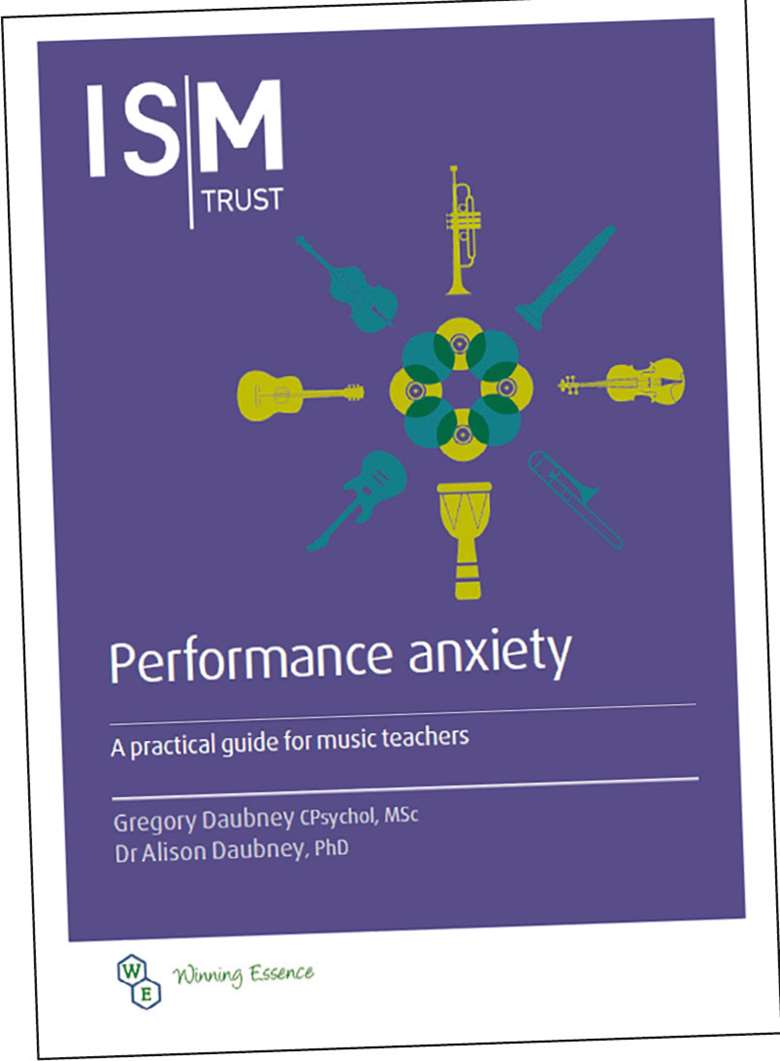Managing performance anxiety: The ISM Trust's guide
Friday, November 1, 2019
The ISM Trust has recently restyled its guide to coping with performance anxiety into a handy new book. MT hears about the motivation behind the publication

You may know someone whose love for performing has dwindled due to performance anxiety or ‘stage fright’, or perhaps you have experienced this yourself. You may have felt, or seen in others, some common symptoms of performance anxiety when performing – sweaty hands, faster heartbeat and questioning your ability, combining to produce a poorer performance.
Many of the world's greatest musicians have experienced performance anxiety. It does not discriminate who it impacts, and there is no shame in experiencing it. Most musicians will experience it at some point to a greater or lesser degree, and that includes our students.
Performance anxiety is commonly separated into anxiety felt in the body (eg a rigid posture, rapid heart rate and excessive sweating) and anxiety of the mind (consisting of emotions such as fear, nervousness and worry combined with negative thoughts about one's ability).
In the short term, performance anxiety commonly stops students from performing at their best and can be frequently accompanied by feelings of failure and inadequacy. If left untreated, performance anxiety can lead to demotivation, feelings of helplessness and complete withdrawal from musical learning and engagement.
We need to be aware that what we may not view as a ‘performance’ may be an event that, in the mind of a student, provokes deeply felt anxiety. Performance is integral to musical behaviour so, as teachers, it is important to have practical strategies that can be integrated throughout our students’ musical lives. These need to be developed over time.
There is much you can do to avoid putting students in overly stressful situations. Finding ways to support students to feel their work is valued without putting them under excessive pressure is of paramount importance; building a supportive culture where students feel more confident to take creative risks in a safe environment is crucial.
With their combined background in performance psychology and music education, Gregory Daubney, MSc, MBPsP and Dr Alison Daubney, PhD have authored the ISM Trust's Performance anxiety – a practical guide for music teachers, an easy-to-use publication that contains practical strategies that you can immediately integrate throughout your teaching, to harness the positive energy and motivation that performance anxiety can bring to your students. It is equally useful whether you're teaching in the classroom, giving instrumental lessons, or leading ensembles – in fact, any domain where a ‘performance’ takes place, no matter how informal.
Restyled as a handy A5 book, the ISM Trust's Performance Anxiety – a practical guide for music teachers is a ground-breaking publication designed to provide you with easy to use, practical strategies to help your students gain self-confidence and prepare effectively for upcoming performances over three key time periods: long-term strategies, the week leading up to a performance, and the 24 hours leading up to, throughout and after a performance.
Performance Anxiety – a practical guide for music teachers is available as a printed book for £10 (£8 for ISM members) or an e-book for £5 (£4 for ISM members). Find out more at bit.ly/ISM-perfanx
In the authors’ own words
Gregory Daubney, MSc, MBPsP: ‘This resource is a highly practical guide packed full of strategies to help music teachers of all experience levels assist their students with handling the psychological demands of music performance by developing key psychological skills in a simple and purposeful way. By providing practical strategies to enable students to effectively cope with many of the broad range of symptoms of music performance anxiety, this resource allows music teachers and students to feel confident that their future performances will be successful. ’Dr Alison Daubney, PhD: ‘Sitting at the piano or standing waiting for the first chord of the rock band to start up can easily feel like a vulnerable and exposing place for a performer of any age and experience level. However, with the simple and easy-to-use practical strategies contained in our guide to handling music performance anxiety, teachers can support students in learning to enjoy and embrace the experience of performing by using their nervous energy to promote positive future experiences.’

